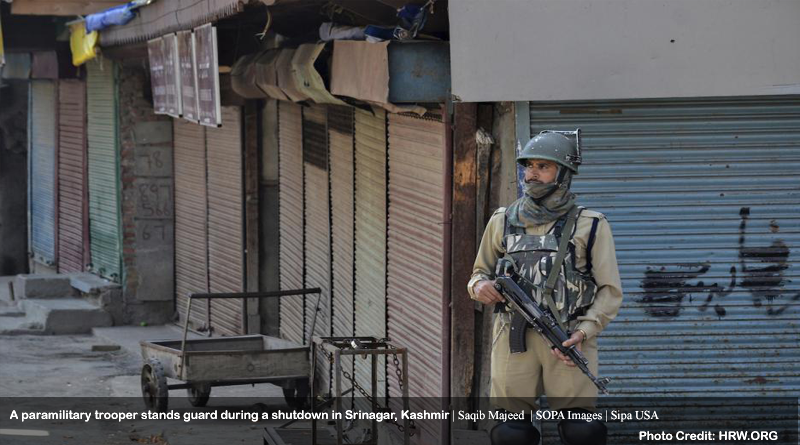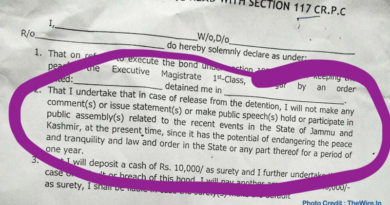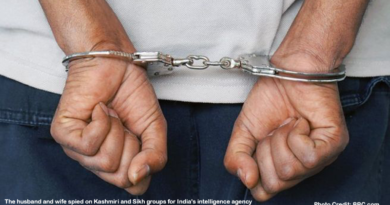India: Free Kashmiris Arbitrarily Detained
(New York) – Indian authorities should immediately release detained Kashmiris who have not been charged with a recognizable offense. Several thousand Kashmiris, including politicians and opposition activists, have been held in preventive detention since August 5, 2019, when the Indian Parliament voted to alter the autonomous constitutional status of Jammu and Kashmir state and split it into two federally governed territories.
Those detained include approximately 400 elected officials and political leaders, as well as former chief ministers of Jammu and Kashmir belonging to the National Conference and the Jammu and Kashmir People’s Democratic Party. The authorities have reportedly detained nearly 4,000 people, including supporters of political parties, separatist leaders, lawyers, journalists, and people who allegedly had records of participating in violent protests. There have been serious allegations of torture and beatings. Many detainees have not been allowed to contact their families or lawyers. According to an official document seen by Reuters, as of September 6, the authorities had arrested more than 3,800 people, and of them, 2,600 had been released. The government should release a list of all detainees and their whereabouts, Human Rights Watch said.
“Anyone who has been detained in Kashmir without evidence of a crime should be immediately and unconditionally released,” said Meenakshi Ganguly, South Asia director at Human Rights Watch. “It is essential for the authorities to allow every detainee access to lawyers and family members.”
In addition to the arbitrary detention, the government has also imposed broad restrictions on freedom of movement and banned public meetings. It has continued the shutdown of the internet and mobile phone services.
The authorities have in many cases detained people or placed them under house arrest without providing a legal basis. Shah Faesal of the Jammu and Kashmir People’s Movement was prevented from leaving India and detained after he criticized government actions. A senior police officer said on Twitter that Faesal was spreading “hopelessness” instead of accepting “new realities.” And the authorities told the court in response to a habeas corpus petition that he was detained for “instigating” people against the country. Neither allegation is a sufficient basis for detention, Human Rights Watch said. He remains in custody. On September 13, Faesal withdrew his petition in solidarity with other detainees that “have no legal counsel or other remedies.”
Lawyers contend that the authorities have delayed responses to drag out the cases in court. “Habeas corpus petitions should have been decided with great speed, but there is no credible response of the state showing legality of custody,” one lawyer told Human Rights Watch. “Similarly, in the petitions challenging the lockdown, the government is yet to file in court even the orders that form the basis of the mass clampdown.”
On September 5, the Supreme Court ordered the authorities to shift the ailing leader of the Communist Party of India (Marxist), Mohammed Yusuf Tarigami, who is under house arrest in Srinagar, to a hospital in Delhi. The party’s general secretary had filed a petition that Tarigami was unable to receive adequate medical care due to restrictions on the family and “nobody was allowed to exit or enter the house.” The court also ordered the authorities to allow others, including the daughter of the detained former chief minister, Mehbooba Mufti, to visit their relatives.
Many political party leaders are being held under house arrest. They include supporters of Kashmiri political parties, who had previously been subjected to violence, threats, and harassment by Kashmiri militants for ignoring their calls to boycott elections.
Srinagar Mayor Junaid Azim Mattu of the Jammu and Kashmir People’s Conference party was released from house arrest and allowed to travel to Delhi for cancer treatment. While out of detention he criticized the Indian government’s actions in Kashmir in interviews with the media. When he returned from his treatment on September 3, he was placed back under house arrest. “The persecution of mainstream workers is shocking beyond belief.” Mattu told journalists. “Several of my party men are under detention.”
An unrevealed number of people with police records for previously participating in violent protests or “stone pelting” are being held under the Public Safety Act, a controversial law that allows detention for up to two years without charge or trial. Others have been released on istighasa, a term used by Kashmiris for people detained by the police on the basis of suspicion but then released after a certification by local village authorities. While no case is filed, they remain under watch and are sometimes expected to appear regularly at local police stations.
Some Kashmiris told Human Rights Watch that Indian security forces have also detained family members of suspects instead, when they have failed to locate them. This amounts to collective punishment, in violation of international human rights law.
On September 7, India’s national security adviser, Ajit Doval, told NDTV that the government had no specific plans to start releasing the detainees. “We have been very careful about the entire situation,” he said. “No human right has been violated.”
Prolonged detention without charge violates India’s obligations under international human rights law. The International Covenant on Civil and Political Rights, to which India is party, prohibits arbitrary arrest and detention. Anyone detained should be promptly taken before a judge and provided the reasons for their arrest and detention and any charges against them. They should have prompt access to a lawyer and family members.
Those detained under the Public Security Act and transferred outside Jammu and Kashmir should have adequate time and facilities to prepare a defense and to communicate with counsel of their choice. United Nations treaty bodies and special procedures have called on India to amend the Public Security Act to ensure that it complies with its international human rights obligations.
The UN Human Rights Council, at its current session in Geneva, should urge India to act on recommendations in the report of the UN high commissioner for human rights, Human Rights Watch said. At the upcoming meeting of the UN General Assembly in New York, India’s international partners should put human rights concerns at the center of their engagement with Indian officials and press the government to uphold international human rights standards.
“India is making a mockery of its human rights commitments by denying Kashmiris a voice in their future, jailing political leaders, and suspending basic freedoms,” Ganguly said. “The government’s heavy-handed measures are only making a bad situation worse.”
This article was published on September 16, 2019.
Courtesy:
https://www.hrw.org/news/2019/09/16/india-free-kashmiris-arbitrarily-detained




